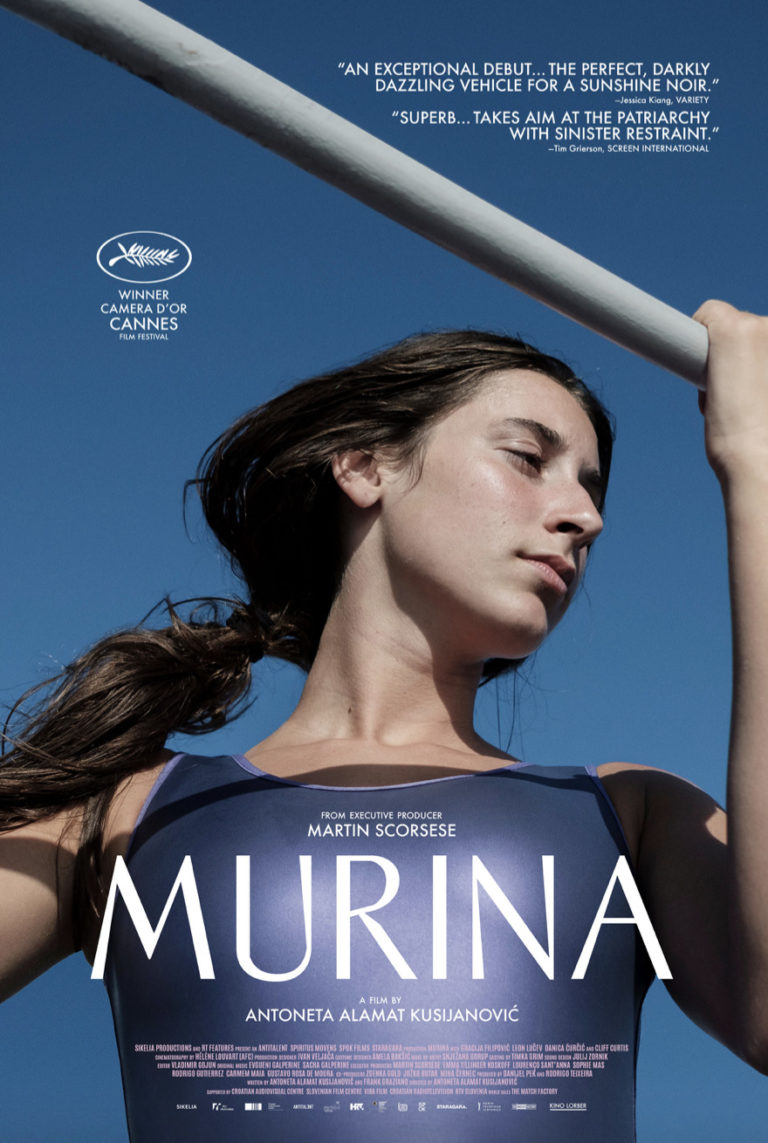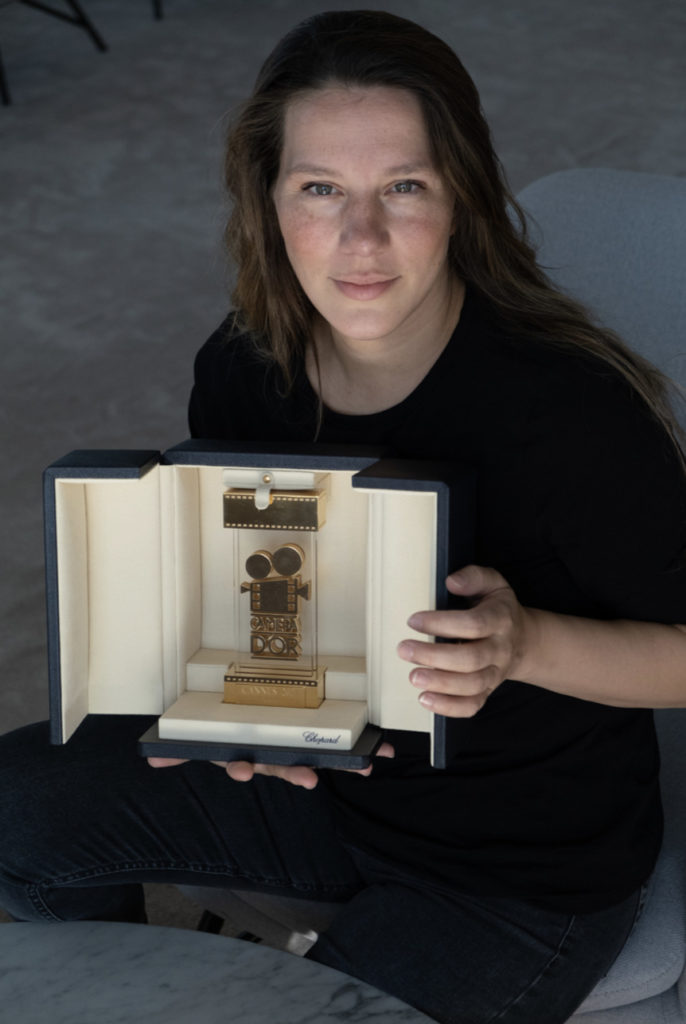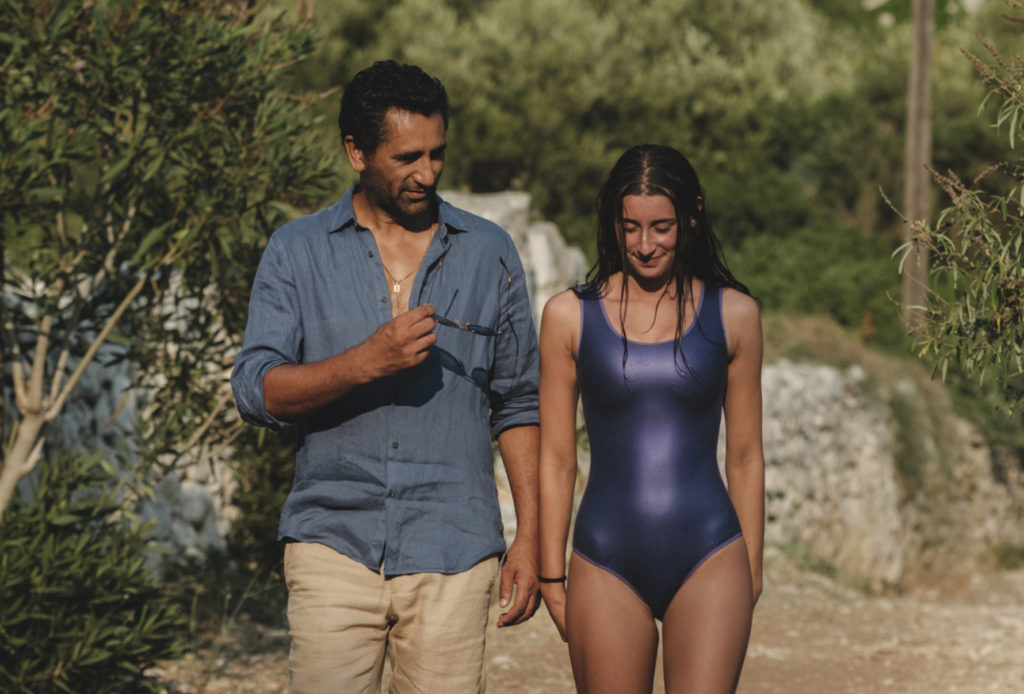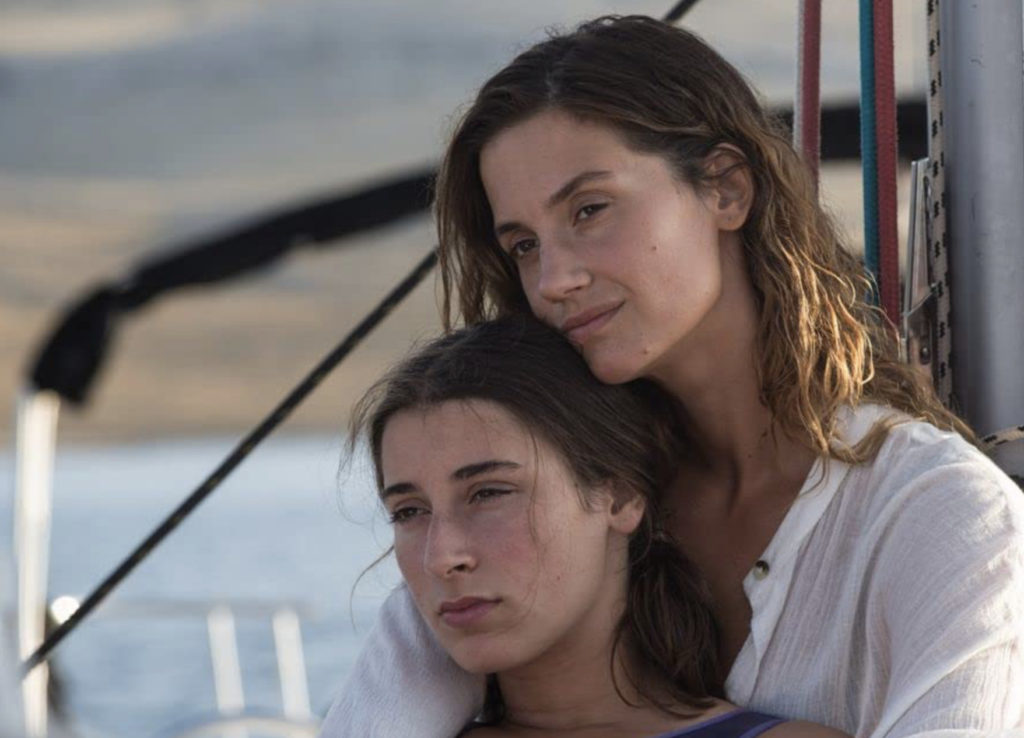
Synopsis : Tensions rise between restless teenager Julija and her oppressive father Ante when an old family friend arrives at their Croatian island home. As Ante attempts to broker a life-changing deal, their tranquil yet isolated existence leaves Julija wanting more from this influential visitor, who provides a taste of liberation over a weekend laid bare to desire and violence.

Exclusive Interview with Director Antoneta Alamat Kusijanovic
Q: So you made your short film “Into the Blue” in 2017. How come you wanted to continue explore the character Julija with the same actress Gracija Filipovic in your first feature film?
Antoneta: It was about outside nature. It is so wild and dangerous and in conflict with the inner nature of adolescence. It was such a great juxtaposition to her features, to her image. And to this unsettling things that were going on beyond her understanding.
Q: She seems to be one with the water.
Antoneta: Gracija is a professional swimmer. That is why I cast her first in “Into the Blue”. I knew I needed one to be able to execute the project.
Q: How much was Gracija part of developing the character?
Antoneta: By being her and by me working with her I developed the character for her, knowing her capacity as a non-actress. I incorporated in the script all the things that were the most alluring and interesting about her. She is great, very intuitive, has the right amount of measure and a very good acting taste.
She is a very hard worker and thinks thoroughly about what is expected of her as an actress. She comes truly prepared. Very good collaborator.
Q: This water, this sea, seems to be a place for freedom for her. But it is also a dangerous, melancholic and sensual place. What does the sea represent for you?
Antoneta: The sea is unknown. In the film it is somehow stands in for the subconscious. It is not good or bad. It just reflects the things that we might desire and would not express, which is both sensuality and violence or spilling blood.
It exercises some emotions that are unspoken and not allowed at the surface, both in the positive and negative sense.
Q: As a contrast in the film, the land is strongly present. It is rocky and kind of hostile. The father is trying to sell the land, even if he doesn’t own it. Could you talk about this aspect and about owning a land?
Antoneta: I think you never really own a land, you know. You are preserving it for the next generation. It makes me sad and furious that what is not yours to sell you can erode for the generation that should build life there. So many young people who are talented, creative and hardworking are leaving my country. Culturally, politically and socially they are pushed out of the land. There’s an old, stagnating, uneventful and unimaginative society that doesn’t get off the throne. I think it is happening everywhere in the world, but of course I am mostly affected when it is in my own country.
And the land is a very important visual tool, same as choosing the house or the art direction. It is a backdrop, an architecture. People behave differently depending on the type of architecture. It really defines the movement and the movement defines psychology. I think that this movie could never have happened with the same tensions inside an air-conditioned apartment in a skyscraper. It was essential that this architecture infuse the tensions. There is no place to hide, no shade, no break. Everything is so stark and uninhabitable that it pushes people to the edge.

Q: You are from Croatia, you live in New York and you go back to Croatia to make this film. How does this outsider point of view affect your filmmaking?
Antoneta: I am one hundred percent Croatian. But I am also one hundred percent New Yorker. I was born and raised in Croatia but I was really educated in New York. I realized that I could honor my true calling by being in New York. There wouldn’t be an opportunity for that in my country. I could only tell the stories I wanted to tell through the filter I gained in New York and with an impulse I got from my country. I really need both. I am standing across The Atlantic with two legs.
Q: When I saw the film it made me think of the Italian director Alice Rohrwacher and Michelangelo Antonioni’s “L’avventura”. Which films and directors have inspired you?
Antoneta: I have a very disappointing answer. I don’t watch films in order to direct and write my own. I find refugee in theater because I come from theater. I was a child actress from the age of 6 till 18. I would say that the influences for “Into the Blue” and “Murina” come from Shakespeare, specifically “Othello”.
After seeing Alice Rohrwacher’s “Happy as Lazzaro” I realized that Hélène Louvart is my cinematographer for “Murina”. I sent her the script and went back to watch all of her other films. I understood why I felt that way. There was an incredible familiarity in the way she depicts family, sensuality and dynamics. I felt close to her even though I had never met her.
Q: In the film there are often things that are about to happen, but they don’t really happen. I am thinking of violence, love, sensuality and tragedy.
Antoneta: I am always more interested in watching the foreplay than the orgasm. Arriving and satisfying our needs and desire deflates them. I am always looking for a way of living in the world of certain desire but never fully exercising it, before entering the new question. The spine of “Murina”, where there is not so much plot, is built upon that. The satisfied desire of the audience that moves along with character’s growth.

Q: The title “Murina” is Muray eel in Croatian. Why is this animal so important for you?
Antoneta: It is delicious. I remember we would catch it as a child. There is something very sensual about it and also violent. Maybe even vulgar. Murina is a female noun. It is a she. So stripping off her skin and reversing it up side down, and melting her fat on to her skin and on to her meat to remain moist, felt resonating somehow to how women are treated in my country.
On the other hand she is very combative. She’d defend herself until she dies. That is how Julija is. She is ready to risk her life and destroy her family to free herself.
Q: Talking about how women are treated in your film. The father represents chauvinism, patriarchy and toxic masculinity. He is abusive and violent. Where do you think his behavior comes from?
Antoneta: I think it’s very common in Croatia. It comes from watching but not having. We are in a country that is overflown with incoming wealth of men sitting on rocks, islands and lands. It is such an easy way to be wealthy with little employed work. It especially teaches the new generation that was already born in that mentality. It teaches them to surrender to life and wait for things to be given. I think that this mentality inevitably creates violence and frustration. Of course I can be very judgmental of my own country but I can speak about it. But to not be so harsh I think it is generally the movement that is happening now in the world. It is inevitable for violence and such behavior where there is no creative work or no creation.
Q: Why do you think so many people in the world can relate to your film?
Antoneta: I think it is very local but very relatable. It deals with the ABCs of human behavior within a family. The sense of freedom. Whether your children are your children. Whether you own them. Gender roles. The desire. The remorse. The guilt. The sense of lost time and the best is yet to come. It deals with all the psychology that is inflicted upon us. The crucial times of change that not only happens in puberty. It happens always in different stages of our life. We can easily define puberty and middle age crises but there are so many areas of those changes in between, that we don’t have names for. And all of that is coming-of-age.
Q: And how did Martin Scorsese come onboard as executive producer?
Antoneta: Very early on The Brazilian Film Production Company RT Features brought Martin Scorsese into the project. It was a very beautiful collaboration with Marty. He really encouraged me to pursue what I wanted to tell. He said that each one of us is a master of our own film because we spend the most time with it. I think that is such a gracious and liberating advice. He is a very youthful and playful person.
Check out more of Niclas’ articles.
Here’s the trailer of the film.

